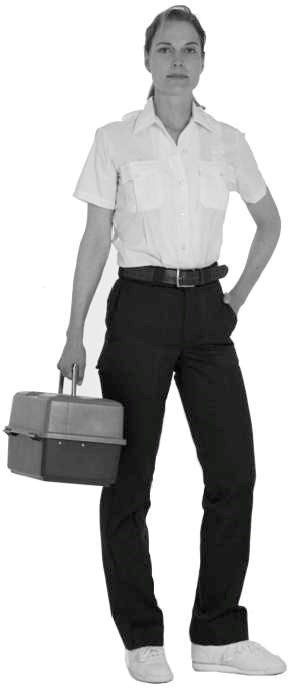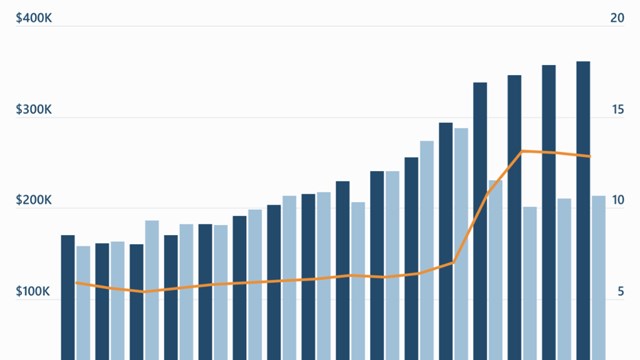
Forget Barbie dolls and dress up clothes—when Janet Leon was a little girl, she probably would’ve preferred to have a mini tool belt and set of screwdrivers. Growing up, she says she fondly remembers shadowing her father, a machinist, around the garage, pointing out his to-do list and helping him tinker with engines and fix-it projects. She eagerly soaked up knowledge of tools, maintenance, machinery and whatever else her dad wanted to teach her.
As an adolescent, Leon would hang out at the local camera repair shop, keenly watching the technicians make equipment repairs until the owner finally put her to work. When she was in college, she supported herself as a locksmith.
Today, Leon has integrated all of this knowledge and passion for systems and repairs into her career as one of the few female building superintendents in New York City—a job that Leon says she loves.
After trying her chops at an acting career, Jennifer Davis moved into her role as a building super.
“I lived in a slum and started fixing things—and I realized that I liked doing it,” she says. A friend in the property management field suggested that she look into being a super and, taking the friend up on her advice, a career was born. Today, Davis is in charge of keeping a 150-unit co-op in Greenwich Village operating well and she supervises an all male staff.
Considered one of the few female doormen—or “doorpersons”—in New York City, Marilyn Rivera has been opening doors and helping Gramercy Park residents with packages, taxis and other requests for more than 13 years. In some buildings, Rivera would be called a concierge—they handle luggage, mail, make reservations and arrangements for guests or visitors; a doorman usually does not have these responsibilities. However, in some buildings, a doorman and a concierge can be one and the same.
Rivera says that the reactions to her being in this profession have been, “quite interesting,” but she loves the job and couldn’t see herself doing anything else.
Women’s Work?
In the past, it would have been almost unthinkable for these three women to even consider a job of running a multifamily building’s day-to-day operations or being a doorman, which implies just that—a man working a door.
In the book Doormen by Peter Bearman, the author says that Sadie Sutton, the first female doorman in New York City, was hired in 1971 and was the subject of a long feature article in The New York Times. In 1997, New York City’s famous Plaza Hotel hired its first female doorman and again, it made news.
Today, there are more females working as supers and doormen than ever before, but it still hasn’t been easy. No one knows exactly how many women are working as doormen in New York, and there is still controversy and criticism surrounding women in these vocations—even the mere mention of this article drew mixed reactions. Some women declined to go on record, citing that they were afraid of the backlash from their male counterparts. Others agreed to interviews, but requested that their names—and ages—be omitted.
“The last thing I want is someone to tell me that not only am I a woman, but that I’m getting too old for this job,” said one female doorman who preferred to not use her name.
When a major property management firm was asked to comment on the subject of female supers and doormen—just in general, not on any specific controversy—their PR rep replied that the firm “had no comment.”
Jane Smyth* has experienced the controversy first-hand. She clearly remembers one interview for a super job that didn’t turn out the way she had hoped. She says it opened her eyes to some of the distorted views of women in the building maintenance industry.
“I had met the old super, and he liked me,” says Smyth. “I thought I had the job, but then I got a call from the managing agent who told me I was perfect for the job, but he decided not to hire me because the head male handyman didn’t want to work for a woman. I thought that if I could just meet the handyman, then he would like me since I got along with the others, but the manager said no—because he was ‘afraid of a lawsuit,’ yet he was telling me he wasn’t hiring me because I was a woman!”
Up to the Job
The age-old question in any male-dominated industry is “Can a woman do the same job as a man?” When it comes to the sometimes heavy, sometimes dirty work of building supers, and the security responsibilities of doormen, women are often presumed to be too delicate or not imposing enough for the job.
In another job interview, Smyth remembers being asked to lift an extremely heavy, bulky radiator. She replied to the interviewer, “As soon as I see you lift it, I’ll lift it. I didn’t get the job, of course,” she laughs. “But the reality is that probably no man could’ve lifted that radiator. Instead you would turn it, put it on its side, get a dolly and roll it away. It helps to be strong—but it also helps to know how to lift things.”
In a closely watched New York City discrimination suit less than a decade ago, Panathy Hill sued a major management company for discrimination when she tried to get a part-time job as a doorman. Even after security training and a license to carry a gun, Hill was told that the job was off-limits to women.
Davis admits that she was once sexually harassed by a rental tenant at a previous building and had to discuss the delicate situation with the board.
Working with a male staff can bring other challenges too. “Generally, with an all-male staff, it can take a while to get them to believe that I know what I’m talking about,” says Davis. “I think if I was a man, it might not take that long.”
Business as Usual
The women interviewed for this article say that they rarely have any challenges on the job that are directly related to the fact that they are women. So, if the job is so great, why aren’t the numbers of women entering these fields on the rise? Rivera thinks it’s male perception that’s stopping them. “They probably think there is enormous pressure from the men, and that you won’t be treated right,” she says.
Davis thinks one of the biggest reasons that women feel they may be lacking the skills. “But you can be taught the skills you need,” she says.
“Even today, society doesn’t envision women doing these jobs—we’ve all been socialized into certain kinds of roles,” says Nona Smith, director of Access for Women, a gender equity program for women and girls. The focus of the program is on preparing them for non-traditional technical education, and for occupations in industries where women are still under-represented. “Now we have the educational goal to change all of that.”
Access for Women goes beyond the boundaries of teaching women that being in the building industry is all about sweeping and mopping.
“We have courses in building maintenance,” says Smith.” The students build a room, put up sheetrock, taping, walls, install a light and a light switch, prime and paint, lay a hardwood floor, work on plumbing and bathroom fixtures and more.”
Once a female breaks into the business, organizations such as the Superintendents Technical Association (STA), and the Service Employees International Union Local 32BJ can help with networking and maintaining professional contacts in the industry—although according to reps for both groups, there are not many women currently attending these meetings.
SEIU Local 32BJ is the largest building service workers union in the country, representing more than 85,000 cleaners, doormen, porters, maintenance workers, window cleaners, security guards, superintendents, and theater and stadium workers in New York, New Jersey, Connecticut, Pennsylvania, Virginia and Washington.
Resident Reactions
Whether the number of women supers and doormen increases as time goes on may hinge on whether building residents truly care whether their doorman or super is a woman. The handful of co-op and condo owners polled for this article mostly just want the job done.
Matt Girgenti, who lives in a building with an all-male staff but works in a building with a female doorman, puts it bluntly: “Who cares?”
“I don’t think I’d even blink twice if they hired women,” says Girgenti. “I suppose the general objections that might get raised are security and repair acumen, but the rejoinders are many. Would your male doorman physically chase down an intruder, or just call the police? Would having your keys in the hands of female super for repairs make you feel more or less safe? Is there anything intrinsic in being a woman that makes you less able to fix a leaky sink or set mousetraps? I don’t think so.”
Brad Davis agrees. “I live in a building owned and managed by Rockrose Development Corp., and we had a female doorman substituting for several months this summer,” says Davis. “I found her to be quite capable, and very cheery—I was sad to see her go.”
There is also ongoing debate among those in the industry about whether women can even bring stronger qualities to the table then men can—including extra ‘cheeriness.’
Rivera says that she’s a great multitasker and believes women can talk down a volatile situation with a softer voice. Jennifer Davis doesn’t believe the job is gender specific at all, but believes that women look at the overall cleanliness of a building with a different eye. Leon thinks that she actually had an advantage coming into a job as a super.
“The other guys didn’t see me as competition, and were more willing to talk,” she says.
While women are making headway in a still male-dominated field, it does seem that the industry is still not as receptive as we would expect them to be since the days of Sadie Sutton. But then again, maybe it’s just about easing women’s fears of entering what has historically been a men’s field. But then again, only time will tell.
Lisa Iannucci is a freelance writer living in Poughkeepsie, New York.
*Some names in this article have been changed.






Leave a Comment